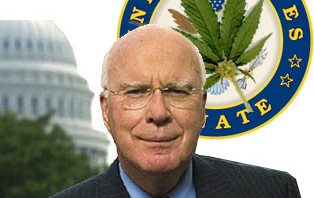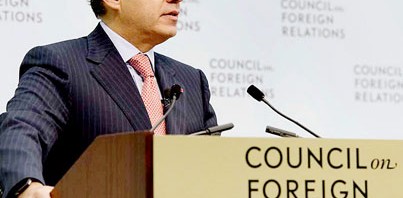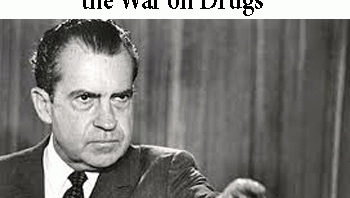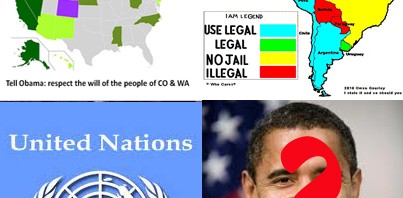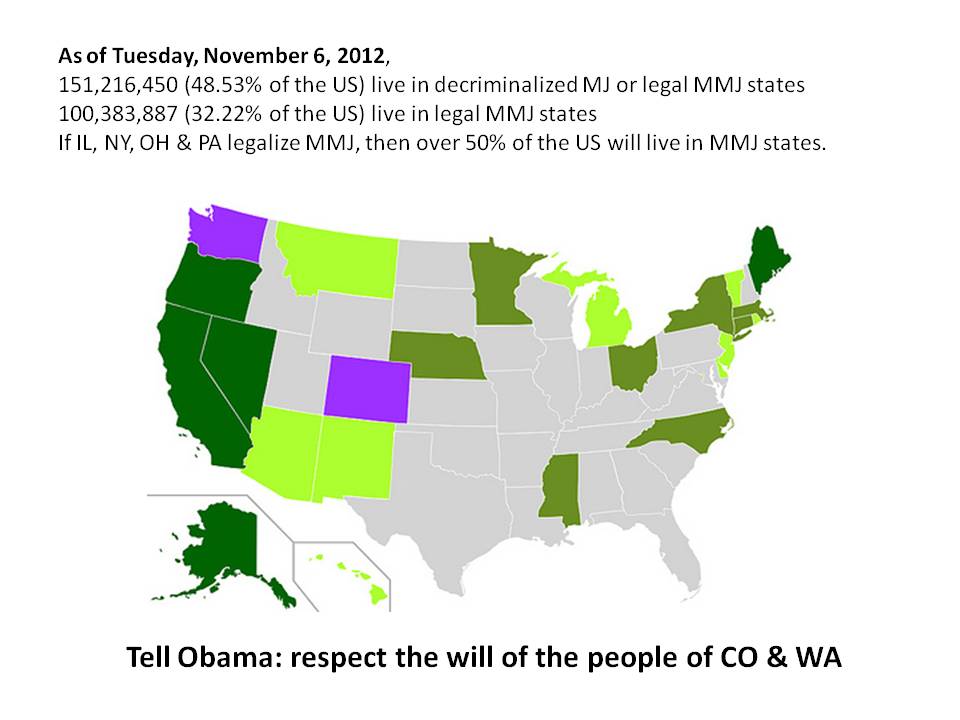3 years to shift the balance of power from the drug prohibitionist camp to the reformist camp at the UN
On November 27, the UN General Assembly adopted a Mexican proposal to hold an emergency drug policy summit, scheduled for early 2016 after an intensive preparatory process that will begin next year.
The proposal was first introduced to the UN general Assembly by Mexico, Colombia and Guatemala on September 26, joined by Honduras, Costa Rica and Belize on November 12. It was then backed by the majority of Latin American governments, as well as those of Spain and Portugal at the Ibero-American Summit in Cadiz, on November 17.
While all the backers of the proposal share a common concern about the calamitous drug-trafficking situation in the region, they are far from agreeing on a common approach and seem to be all over the spectrum on the issue. Uruguay is on the verge of becoming the first country in the world to legalize marijuana under state control. Guatemalan President Otto Perez Molina has been the most vocal advocate of legalization since taking office in January, while neighboring Honduras led by Porfirio Lobo, is a hard-line prohibitionist, with most other countries spread between these two extremes.
The two key regional players, Colombia and Mexico have voiced rather ambiguous positions. Colombian President Santos has repeatedly expressed his support for legalization, if the rest of the world agrees, a big if indeed, but has refused so far to take the lead of a drug policy reform alliance. He may be getting closer to assuming this role for which he is particularly suited. In his foreword to the report “Governing The Global Drug Wars” published in October by the Transnational Institute, President Santos declared: “The time has come to take a fresh look and we invite world leaders, scientists and experts to start an open, serious and honest debate about this war. The time has come to think outside the box… This is a global problem that demands a global solution, and therefore a new international consensus is needed.”
The Mexican position has been even more puzzling since Calderon took office in 2006 and started a brutal confrontation with the Mexican drug cartels that left over 60,000 casualties, 25,000 disappeared and over 200,000 displaced. Internally, Calderon defended fiercely his hardcore War on Drugs policies, while abroad, he has repeatedly admitted that “market-oriented approaches” should be considered. He even declared on September 24, 2012, at the Council on Foreign Relations: “ Let’s be honest, I don’t see any [solution] other than the regulation of drugs in the global marketplace, starting here, in the United States.” (“Seamos honestos: no se me ocurre otra que no sea la regulación de las drogas en el mercado global, empezando por aquí, por Estados Unidos”). It should be noted that the last two former Mexican Presidents, Vicente Fox and Ernesto Zedillo are both active drug policy reformists.
Mexican president Felipe Calderon term ended on December 1st, and the position of his successor Enrique Peña Nieto is still unclear. Peña Nieto was invited at the White House on November 27, and the recent legalization of marijuana in Colorado and Washington was on the agenda, even is nothing transpired. While he reiterated his personal opposition to legalization, in a Time interview published on November 27, Peña Nieto acknowledged that it may be time to reassess the War on Drugs and called for a hemispheric debate on its effectiveness. According to Peña Nieto, state legalization “creates certain distortions and incongruences, since it’s in conflict with the [U.S.] federal government… That will impact how Mexico and other countries in the hemisphere respond.” He even raised the possibility that Mexico itself may legalize marijuana.
On the other side of the Atlantic, Portugal and Spain have some of the most liberal drug policies in the world. Portugal, where all drugs have been decriminalized in since 2000, is held as the poster-boy of drug policy reform, while cannabis clubs are legal in Spain, with the blessing of the Spanish Supreme Court.
So, what does the prospect of a UN summit on drug policy means for the drug policy reform movement, and what can be expected from it? There have been after all quite a few similar events since the Adoption of the 1961 Single Convention on Narcotic Drugs. Will 2016 be the year when reality finally sinks in within the international community that drug prohibition has failed and that it is time to look for more sustainable alternatives? There are good reasons to believe so.
The 1971 Convention on Psychotropic Substances set lofty goals of complete eradication of drug use, toned down to a 50% reduction within 10 years in 1988, a goal reiterated in 1998, but abandoned altogether in 2008 amidst growing restlessness within the UN community. Furthermore, the “soft on drugs” label is rapidly losing its stickiness as the political risk of drug reformist positions is plummeting rapidly. Drug policy reform may even start turning into political asset in some circumscriptions, as was the case in Washington this November, when most of the Democrat political establishment lined up behind the legalization initiative.
As the consensus behind the War on Drugs starts crumbling, and as countries start breaking ranks and rejectthe dominant approach to drug policy altogether, the international community will see reduced opportunities for reprisals and sanctions. Uruguay’s intention to legalize marijuana under state control has been met with rather muted UN opposition so far. Sanctions against Uruguay will be hard to justify if similar sanctions are not imposed on Washington and Colorado, a prospect not even remotely likely, and may just galvanize regional rancor. Other Latin American countries might emulate the Uruguayan model, with neighboring Argentina a real potential candidate.
In the US, the number of medical marijuana states is likely to reach 20 in 2013 as proposals are set to be presented to several state legislatures, including New Hampshire, Illinois and New York. Rhode Island, Maine, Vermont, and Massachusetts, as well as Oregon and Montana may also try to adopt full marijuana legalization through their legislatures, while a legalization initiative is already on the drawing board in California. The battle has even been brought to the US Congress, with a bipartisan bill that would enable the states to make their own marijuana laws. The bill is probably still symbolic at this stage, and stands very little chances, but it may be a harbinger of things to come.
Embroiled in a deep economic and financial crisis, Europe is staying relatively on the sidelines on drug policy issues, even though (or maybe because), European drug policies are generally leaning on the liberal side and drug abuse is substantially lower there than in the US.
Ultimately, the fate of the 2016 special session lies most likely in Washington DC. The US has been the initiator, main architect and chief sponsor of the prohibitionist approach for over a century, and has over the years imposed her prohibitionist policies to the rest of the world. All current international treaties on illicit drugs having been produced and backed by successive US administrations over the past 50 years, a complete U-turn seems unlikely. But with 18 states and the district of Colombia in oblique violation of the international treaties and Colorado and Washington now squarely confronting them, the “tough on drugs” stance is increasingly untenable. Unless it reverses its attitude and draws the lessons from a century of failed prohibitionist rule, the US will be increasingly stuck between a rock and a hard place and her prohibitionist-in-chief posture will become more and more indefensible.
I have argued for quite some time that drug policy reform will be achieved by cracking the US prohibitionist backbone through the combined internal pressure from the states and external pressure from the US allies, principally, in Latin America. In a truly historic year for drug policy reform, the pieces of the global drug policy reform puzzle appeared to be falling into place one by one in 2012, and the US resolve seems to be faltering. The Obama administration appears hesitant after the decisive victories for marijuana legalization in Colorado and Washington. By intensifying the crackdown on medical marijuana over the past few years, Obama brought the War on Drugs to the Caucasian community, which may have further galvanized support for legalization. Whether hidden agenda or law of unintended consequences, it clearly narrowed the administration’s margins of maneuver and crackdowns on the newly legalized marijuana states may backfire even more, further stiffening support for legalization.
While the 2016 special session could easily be derailed, if drug policy reformists, especially in Latin American and within the US, use the next three years to keep resolutely pushing for reform, we may see the emergence of a global coalition and a new global consensus on drug policy. This is an opportunity that reform activists cannot afford to waste.
Jeffrey Dhywood
Investigative writer,
Author of “World War D – The Case against prohibitionism, roadmap to controlled re-legalization”
“World War-D” on Amazon: http://www.amazon.com/dp/0984690409/
www.world-war-d.com
Facebook page: http://www.facebook.com/worldward
Twitter: @JDhywood
jd (at) world-war-d.com
Further readings
http://www.sre.gob.mx/en/index.php?option=com_content&view=article&id=1756:the-un-general-assembly-adopts-mexicos-resolution-on-international-cooperation-against-drugs&catid=27:archives&Itemid=64
http://www.insightcrime.org/news-briefs/un-debate-global-drug-policy
http://www.druglawreform.info/en/un-drug-control/item/3980-governing-the-global-drug-wars
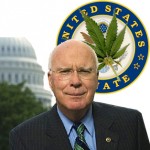 As players on both sides of the issue are pressuring the Obama administration to take a stand on the legalization of marijuana, Senator Patrick Leahy (D-Vt.), Chairman of the Senate Judiciary Committee, is planning a hearing next year to discuss federal policy towards Colorado and Washington State now that they have legalized marijuana. Leahy also sent a letter to drug czar Gil Kerlikowske, offering a compromise solution: “One option would be to amend the Federal Controlled Substances Act to allow possession of up to one ounce of marijuana, at least in jurisdictions where it is legal under state law.”
As players on both sides of the issue are pressuring the Obama administration to take a stand on the legalization of marijuana, Senator Patrick Leahy (D-Vt.), Chairman of the Senate Judiciary Committee, is planning a hearing next year to discuss federal policy towards Colorado and Washington State now that they have legalized marijuana. Leahy also sent a letter to drug czar Gil Kerlikowske, offering a compromise solution: “One option would be to amend the Federal Controlled Substances Act to allow possession of up to one ounce of marijuana, at least in jurisdictions where it is legal under state law.”
